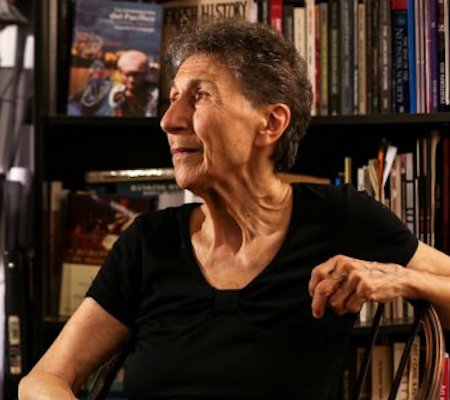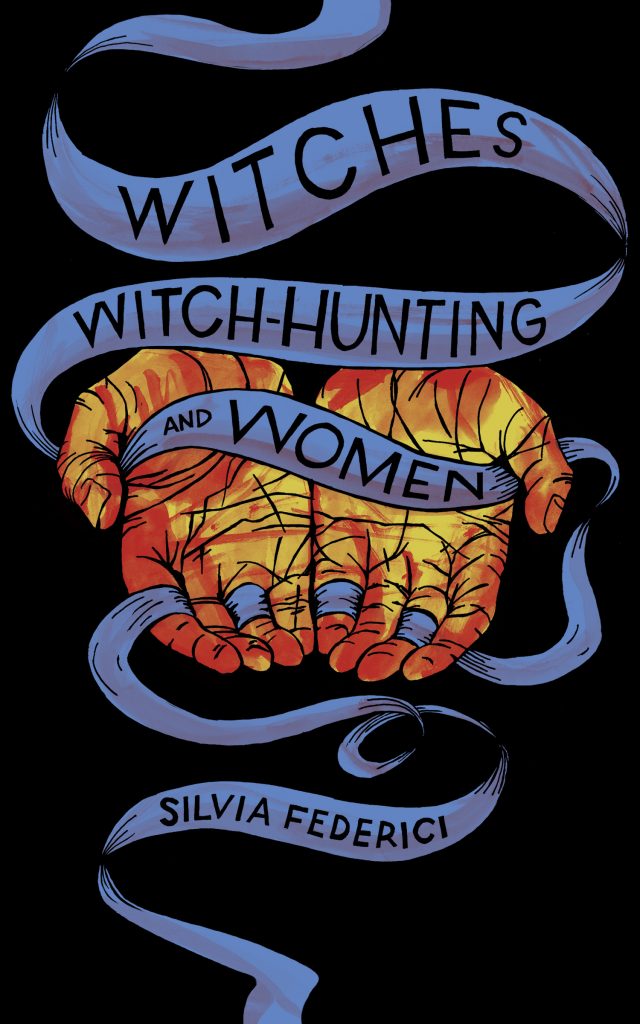
Silvia Federici, author of “Caliban and the Witch,” speaks to HuffPost Brazil about a new kind of witch hunt and how it aims to control outspoken women.
By Andrea Martinelli /HuffPost Brazil
The Huffington Post
November 1st, 2019
Witch hunts aren’t just a thing of the past. The infamous campaigns of 16th- and 17th-century Europe and the “New World” that targeted rebellious women are making a comeback around the globe, says Italian-American philosopher and historian Silvia Federici.
The witch hunts responsible for the deaths of thousands of women in past centuries are just as cruel today, Federici says. But this time, they are aimed at female activists whom society and governments deem to be the “new witches.” REAL LIFE. REAL NEWS. REAL VOICES. Help us tell more of the stories that matter from voices that too often remain unheard. Join HuffPost Plus
“Once again, women are being accused of being witches, and to talk about witch hunts today is to talk about the increase in violence against women that begins, especially, with an increase in violence against women who are at the forefront of struggles, like Marielle Franco,” she said, referring to the Afro-Brazilian human rights activist who was assassinated last year.

Federici, 77, knows a lot about witches and the people hunting them. She’s the author of the critically acclaimed book “Caliban and the Witch,” a painstakingly researched investigation into the history of witch hunts in Europe and how they helped to establish capitalism, slavery, and the exploitation of the colonies. Her latest book “Witches, Witch-Hunting, and Women,” traces contemporary patterns of violence against women to these earlier crusades.
Born in Italy and currently living in the United States, Federici is professor emerita at Hofstra University in New York. She was a co-founder of the International Feminist Collective and a part of the Wages for Housework movement in the ’70s, which advocated that women be paid for the domestic work they do.
The historian sat down with HuffPost Brazil in São Paulo during her tour of the South American country, where she discussed the politics surrounding the rights of domestic workers, mothers and female activists involved in environmental and social justice struggles with corporations and governments.
Federici explains how “reproductive work,” or housework and domestic labor, is often undervalued or unpaid, and she emphasized that in order to make society more equitable for women, we need to view domestic work as “real work” that should be supported by the community at large.
You published “Caliban and the Witch” in 2004. In it, you explore the foundations of capitalism from the perspective of women’s history, and now you are publishing “Witches, Witch-Hunting, and Women.” Why revisit the history of witch hunts in today’s context?
For me, the notion of the witch hunt is very important for a variety of reasons. First of all, there was an enormous amount of persecution that was completely erased by history. That was never taught in classrooms. That was never given any importance. What’s worse, the history of witches has been turned into legend, and the figure of the witch has been ridiculed. I have traveled to places where women were burned alive, massacred, and now witch hunts are used as tourist attractions. The image of the witch flying on her broom is made into a fantastic story. Nothing is said about the terrible, terrible persecution.
And furthermore, today, we are learning about new kinds of witch hunts in many parts of the world. In Africa, in India, women are once again being accused [of witchcraft] and are being tortured and killed. Thousands of women have been killed in African countries: in the Central African Republic, in Kenya, in South Africa, at different times over the last 30 years, in Zambia, in Tanzania, and also in different regions across India.
I have traveled to places where women were burned alive, massacred, and now witch hunts are used as tourist attractions.Silvia Federici
Attacking women as witches is connected to developments that stem from new forms of capitalist accumulation, new kinds of work, land privatization, the attack on community relationships, as well as what they call “the new missionary”: Pentecostal groups and evangelical groups. These groups are reintroducing the idea of the devil and demons into their religion. They are saying that these people are unhappy or poor because they are witches. In doing so, they contribute to the dismantling of communities already victimized by problems of austerity, extraction, all issues tied to capitalism.
The question of witch hunts is very important because it helps us to understand which avenues for this particular kind of persecution of women are in fact helping to expand this destructive relationship.
In the book “Witches, Witch-Hunting, and Women” you say that there are “new witches” today. Who are they?
Women are once again being accused of being witches. Violence against women is at the core of it, with an increased occurrence against women who are leading struggles. It is women like Marielle Franco, who are at the forefront of struggles in urban areas, leading the fight against incarceration, against impoverishment, against eviction. Or women who are leading in rural areas, indigenous women like Berta Cáceres, the Honduran environmental activist, who was murdered in 2016. This includes women fighting against industrial agriculture and against genetically modified seeds, etc.
Yes, these are the new witches. Women who are practicing ancient forms of medicine, using herbs and plants — healers — they are the ones now being accused of being witches. So I think it is very, very important to understand that the image of the witch and the accusation of witchcraft is not just something that is a part of the distant past. It is something that once again today is being used to punish women. ADVERTISEMENT
Do the witch hunts happening now, perhaps, help to explain the high rate of femicide and violence against women?
What I am saying is that women are caught in a war. And that war is misguided. It is misguided in proportion to the destruction of our lives. It is misguided in proportion to the destruction of our environment. Of the basic reproductive needs that our families have. So women are really fighting on the front lines. And they are also refusing to be subordinate and dependent upon men.
[Violence] is the reaction of the governments that see women as a vast sea of cheap labor that can be used everywhere. We are the ideal workers. We’re in the factories, in the homes, in the service industries, and we’re often in all of those places at different times of the day. There is an enormous amount of exploitation taking place. And there are an enormous number of battles.
Femicide, violence, accusing women of murder when they want to have an abortion, these are all ways of intimidating and suppressing a feminist mobilization, a feminist insurgency.
Here in Brazil, the Maria da Penha law, implemented 13 years ago, was aimed at combating and preventing violence against women, but a large part of its affirmative actions aimed at prevention have not been fully implemented. Do you believe that laws are the way to combat violence?
I don’t have confidence in this kind of law, in this kind of measure. We have seen that increasing penalties against aggressors, for example, in many cases victimizes men in the poorest communities. I think that is a very important point here. Where does violence come from? I would say, and I think that I am not alone here, that the majority of violence is always, above all, institutional. Therefore, to turn to the state for protection is a mistake, because, in many ways, the state, the government and the police are the ones who are mostly responsible for violence.
So, the best way to respond to this violence is really for women to organize, to mobilize, to create mutual support networks and ways of connecting, more cooperative ways of doing reproductive work, in order to overcome isolation that women have been forced to live with. I think that is the best form of defense for women, it is the best way for women to confront the state effectively.
Where does violence come from? I would say, and I think that I am not alone here, that the majority of violence is always, above all, institutional.Federici
What I think is happening with this law ― although I do not know it well ― is that it is placing the blame on some men in particular. In other words, if the argument is that there are men who are committing transgressions and they need to be educated and punished, I think we reach the conclusion that individual violence is always a product of institutional violence.
Men become violent because they believe they can act with impunity. Because they have governments that, in some way, tolerate and justify their violence. And we can reach the conclusion that the greatest sources of violence always comes from the top. For example, the militarization of daily life is incredible. There is an important feminist activist named Jules Falquet who did an excellent analysis of the consequences of the fact that there is a growing number of men who have jobs that require violence. The number of guards is on the rise, as is the number of people enlisted in armies, private armies, all of those places have armed men. All of this has an impact on individual lives and on families. If you are fighting with a weapon, responding to problems with violence, when you go home, that is how you respond to your wife, your children.
You assert that the criminalization of abortion is just another form of controlling women’s bodies. Would you like to explain that and speak a little bit about other forms of control? Is domestic work one of them?
Well, the whole way family life is organized is an attempt to control women. This reproductive work, work that generates an enormous amount of wealth for employers, because it is work that reproduces labor — completely without pay or remuneration — is not considered work. That is a form of oppression, of exploitation, it’s a form of violence against women. And there is also the control over a woman’s sexuality. This is how the state appropriates women’s bodies. That is the reason that this is at the core of the feminist struggle.

In May, HuffPost Brazil published a series of articles called “The Social Cost of Being a Mother”which explores the relationship between motherhood, the lack of daycare and the job market. There is criticism that the feminist movement doesn’t fully take these issues into account. What do you attribute that to?
I think that the issue still needs to be resolved. Anything that [companies, bosses, the state] ask for, women do. We need to deal with that. If we have children, even if the man helps out, there is no question that, especially when the children are very young, the overwhelming amount of work is still being done by women. The work is done by women, and yet we have an entire government, an entire social structure, that offers no assistance whatsoever. None whatsoever. That system exploits women. It takes advantage of their labor, but it does not provide the support system that is needed. So that, just for an example, it would be possible to experience motherhood in a way that does not destroy our lives.
I think that the feminist movement has not addressed this question. The movement looks at the issue of abortion, it demands abortion rights, something that is really important, yes, but they are not looking at the other side of the problem, the right to be able to be a mother, the right to reproduce and have a family in a way that does not destroy our lives.
In your lecture at the Memorial da América Latina complex in Sao Paulo, you said that it is necessary to revolutionize domestic work. Would this be the solution?
This kind of revolution is already happening in many ways. I see it in many places. Women are already starting, for example, to organize their lives in such a way that doesn’t make domestic tasks isolating. For example, cooking together. It doesn’t mean that women just have to cook together. But it’s the idea that reproductive work is not an activity that has to exist in isolation, as an individual act, which is how it has been.
This is how [reproductive work is organized] and it is the cause of a lot of suffering, because that isolation, when you work daily, alone and without resources, or with few resources, that is what makes the work of reproduction so hard. So that is why many women reject that kind of work, many women do not want to have anything to do with production.
But I see that there is a desire to establish more cooperative forms of reproduction. The communal kitchens [community restaurants in Peru], the “merendeiros,” those are all specific examples in Latin America. I think that many women would agree that working and performing many of the necessary tasks together can transform their relationship with work, transform and politicize relationships. Because you make collective decisions. You can talk about how to do things with other women. This gives you greater power in terms of the relationship with the state and with men.
And that’s what makes that transformation happen. I am positive that the transformation should be accompanied by a clear interest in reclaiming wealth. When I say reclaiming wealth, it is important to point out that it varies depending on context: it could mean land, access to water, it could be [presence] in Parliament, access to other spaces, services. It’s a mass movement with that as its agenda. Recovering resources so that they can be put to use for our reproduction.
What do we want? That is the conversation that should be happening in women’s spaces. How do we want to reproduce? How we see ourselves, what is the organizing idea behind our reproduction? The idea of everyone all alone, in our houses, each with their child, with their problems, etc.? If not like that, then how? I think that a mass movement, I think that a new generation of young women, should put this matter on the table.
Because the hatred of reproduction persists, and when you are a young woman, you think you’ll find a way, but you won’t find it. I assure you. I did not get married, I did not live with my partner for the majority of our relationship, and I decided not to have children. Even so, I did a lot of domestic work. The question of reproduction, in one way or another, will influence a woman’s life for a long time. Unless you’re a capitalist woman, a bourgeois woman, and then you can hire another woman to do this work. But, obviously, that is not the solution.
Responses have been translated from Portuguese and edited. Read the original HuffPost Brasil interview here.







